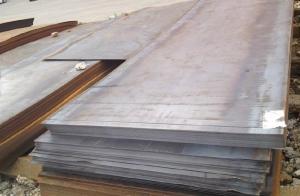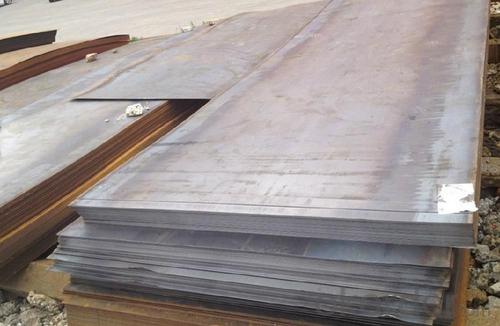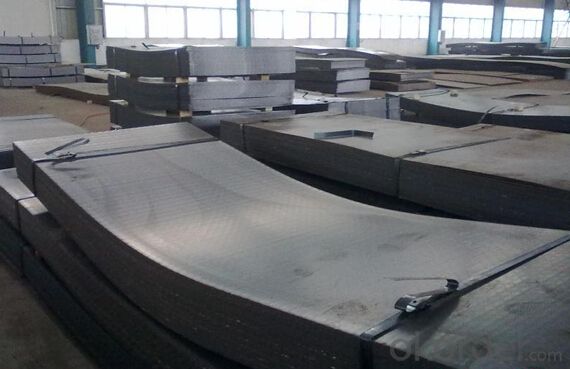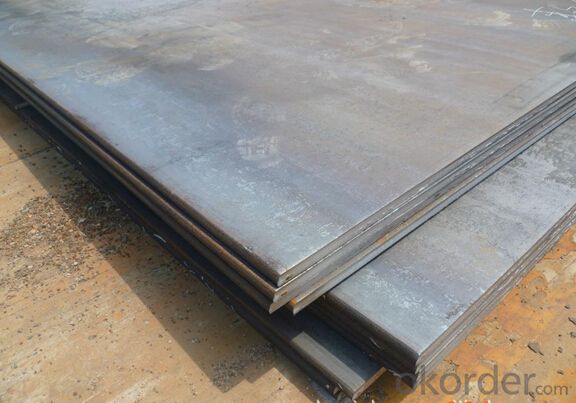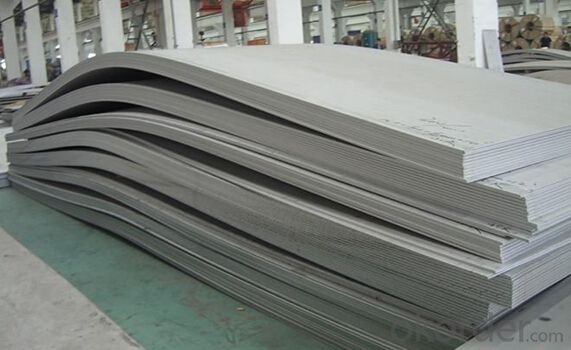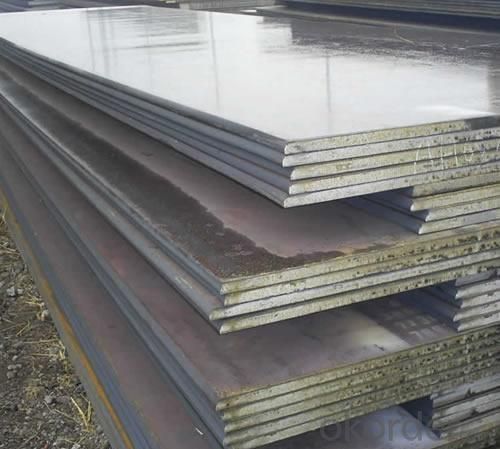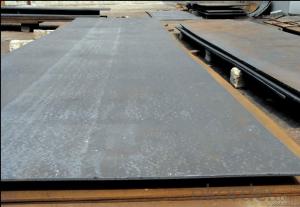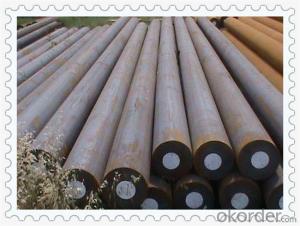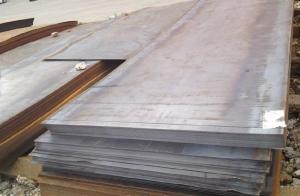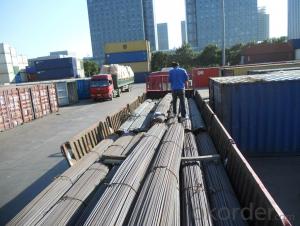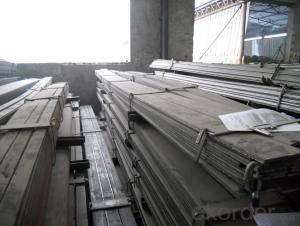Grade Q345/345B thickness 25mm Mild Steel Plate
- Loading Port:
- Tianjin
- Payment Terms:
- TT OR LC
- Min Order Qty:
- 3 m.t.
- Supply Capability:
- 100000 m.t./month
OKorder Service Pledge
OKorder Financial Service
You Might Also Like
Specification
Grade Q345/345B thickness 25mm Mild Steel Plate
Detailed Information of Grade Q345/345B thickness 25mm Mild Steel Plate
| C | Si | P | S | yield Strength MAp | Tensile strength MAp | Elongation % | ||
| A36 | 0.24 | 0.4 | 0.045 | 0.03 | 250 | 400-520 | 26 | |
| C | Si | Mn | P | S | Cu | |||
| A283 | ≤0.27 | 0.15-0.4 | ≤0.9 | ≤0.035 | ≤0.04 | ≥0.2 | ||
| Thickness: | 6mm, 8mm, 12mm, 16mm, 20mm, 25mm, 30mm, 50mm, 80mm, 100mm, 150mm, 200mm | |||||||
| Width: | 1500mm, 1800mm, 2000mm, 2200mm, 2500mm | |||||||
| Length: | 6000mm, 8000m, can cut to width and length | |||||||
| Packing Details; | according to customer‘s require or export’s standard | |||||||
| Delivery time; | 7 days for stock sizes, 20-25 days for new production sizes | |||||||
| Port: | Tianjin China | |||||||
Related Products Overviews of Grade Q345/345B thickness 25mm Mild Steel Plate
Product Name | Typical Grades | Diameter(mm) | Standard Adopted |
Carbon Steel | 20 (1020/S20C/C22) |
Ø16-Ø300 |
GB/SAE/ JIS/DIN |
40 (1040/S40C/C40) | |||
45 (1045/S45C/C45) | |||
Bearing Steel | GCr9 (51100/SUJ1) |
Ø12-Ø250 | |
GCr15 (52100/SUJ2/100Gr6) | |||
GCr9SiMn (A485-Gr.1/SUJ3) | |||
Cr-Mo Steel | 20Cr (5120/SCr420H/20Cr4) |
Ø12-Ø250 | |
40Cr (5140/SCr440/41Cr4) | |||
42CrMo(4140/SCM440/42CrMo4) | |||
Gear Steel | 20CrNiMo |
Ø16-Ø600 | |
20CrMn(5115/SMnC420/20MnCr5) | |||
20CrNiMo(8620/SNCM220/20CrMiMo2) |
Related Products Application of Grade Q345/345B thickness 25mm Mild Steel Plate
Carbon Steel | l Mold bottom l Plastic mold l Construction machinery parts l Automobile parts l Security grills l Screens l Construction |
Bearing Steel | l Aerospace l Navigation l Nuclear energy l Chemical industry l Electronic information l Petrochemical l Instrument and meter l Transportation |
Cr-Mo Steel | l Mechanism & Fasteners gear l Stressed components for vehicles l Engines and machines l Parts of larger cross-section |
Gear Steel | l All kinds of gears l Statically and dynamically stressed component for vehicles l Engines and machine l Larger cross-section parts l Crankshafts |
Company Introduction of Grade Q345/345B thickness 25mm Mild Steel Plate
CNBM International Corporation is the most import and export platform of CNBM group(China National Building Material Group Corporation) ,which is a state-owned enterprise, ranked in 270th of Fortune Global 500 in 2015.
With its advantages, CNBM International are mainly concentrate on Cement, Glass, Iron and Steel, Ceramics industries and devotes herself for supplying high quality series of refractories as well as technical consultancies and logistics solution.
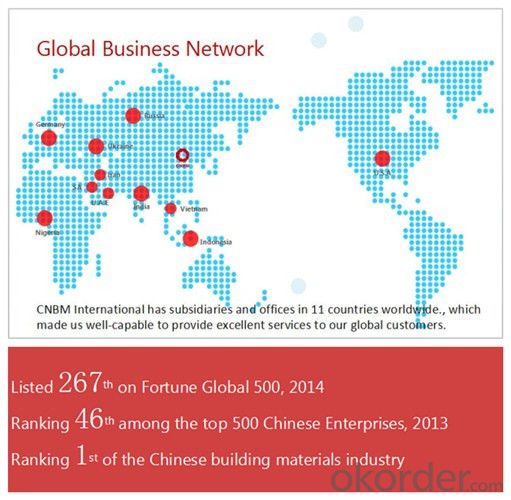
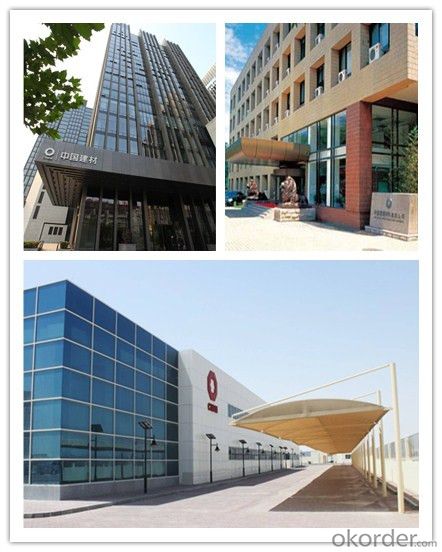
After-sale service | l CNBM provides the services and support you need for every step of our cooperation. We’re the business partners you can trust; you can relax and get on with doing business. l For any problem, please kindly contact us at any your convenient time, we’ll reply you in our first priority within 24 hours
|
Advantages
| l Industry experience over 20 years. l Shipment of goods -More than 70 countries worldwide. l The most convenient transport and prompt delivery. l Competitive price with best service. l High technical production line with top quality products. l High reputation based on best quality products.
|
Packaging & Delivery of Grade Q345/345B thickness 25mm Mild Steel Plate
Packaging Detail | Sea worthy packing /as per customer's packing instruction |
Delivery Detail | 15 ~ 40 days after receiving the deposit |
Products Show
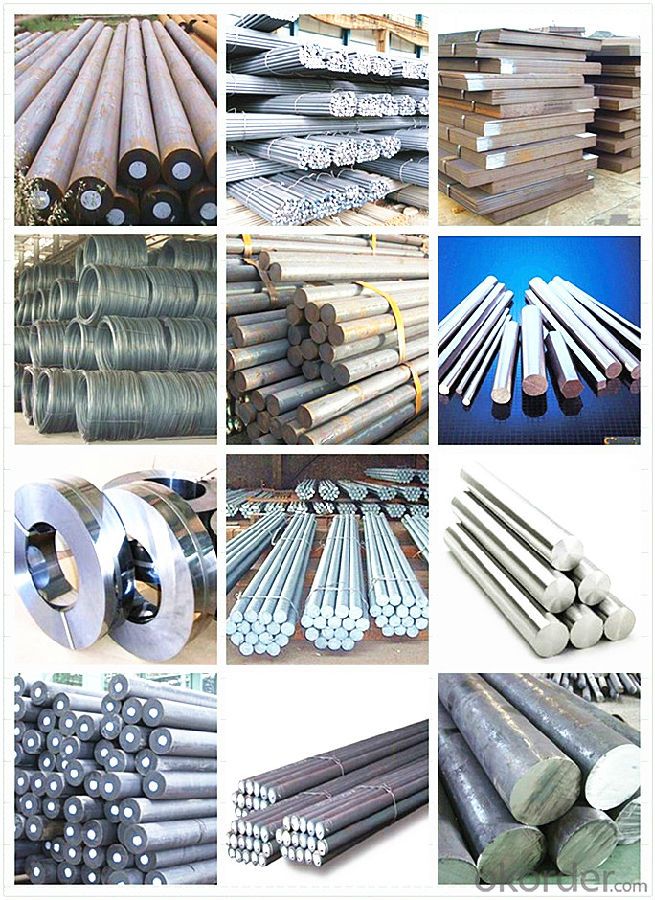
FAQ:
Are you a trading company or manufacturer? | Manufacturer |
What’s the MOQ? | 3 metric ton |
What’s your delivery time? | 15-35 days after downpayment received |
Do you Accept OEM service? | Yes |
what’s your delivery terms? | FOB/CFR/CIF |
What's the Payment Terms? | 30% as deposit,70% before shipment by T/T |
Western Union acceptable for small amount. | |
L/C acceptable for large amount. | |
Scrow ,Paybal,Alipay are also ok | |
Why choose us? | Chose happens because of quality, then price, We can give you both. Additionally, we can also offer professional products inquiry, products knowledge train (for agents), smooth goods delivery, excellent customer solution proposals. |
What's your available port of Shipment? | Main Port, China |
What’s your featured services? | Our service formula: good quality+ good price+ good service=customer's trust
|
Where are your Market? | Covering more than 160 countries in the world |
- Q: What are the challenges in machining special steel?
- Machining special steel presents several challenges due to its unique properties. Firstly, special steel is known for its high hardness, which makes it difficult to cut and shape without proper tools and techniques. Additionally, special steel often contains alloying elements that increase its strength and resistance to wear, but also make it more prone to work hardening and heat buildup during machining. This requires careful selection of cutting parameters and cooling methods to prevent tool wear and surface damage. Furthermore, the presence of impurities or non-metallic inclusions in special steel can cause tool chipping or premature failure, necessitating the use of specialized tooling and processes. Overall, the challenges in machining special steel lie in its hardness, work hardening tendencies, heat generation, and the need for precision tools and techniques.
- Q: Can special steel be used for making power generation equipment?
- Indeed, power generation equipment can be constructed using special steel. Specifically engineered to possess enhanced characteristics like high strength, resistance to corrosion, heat, and wear, special steels are well-suited for use in arduous situations such as power generation equipment that often operates under conditions of elevated temperatures and pressures. Power generation equipment, including turbines, boilers, and generators, necessitates materials capable of enduring harsh operational circumstances and delivering dependable performance over an extended duration. Special steel grades, such as stainless steels, nickel-based alloys, and heat-resistant steels, are commonly employed in the construction of power plants and power generation equipment. Stainless steels are frequently utilized in power generation due to their exceptional resistance to corrosion, which is vital for equipment exposed to significant moisture or hostile environments. Nickel-based alloys are renowned for their outstanding strength at high temperatures, making them well-suited for components subjected to extreme heat, such as turbine blades or exhaust systems. On the contrary, heat-resistant steels are specifically designed to retain their mechanical properties at elevated temperatures, rendering them suitable for applications like boilers and heat exchangers. In conclusion, special steel possesses a variety of desirable properties that render it highly suitable for the production of power generation equipment. Its strength, corrosion resistance, heat resistance, and wear resistance make it an excellent choice for enduring the challenging conditions encountered in power plants, ensuring the efficient and reliable generation of electricity.
- Q: What are the main applications of special steel in the agricultural sector?
- Special steel has various applications in the agricultural sector, primarily in the manufacturing of machinery and equipment. It is used in the production of durable and high-strength components such as plows, tillers, harvesters, and irrigation systems. Special steel's properties, including corrosion resistance and ability to withstand harsh conditions, make it ideal for constructing farm implements that can withstand the demands of agricultural operations. Additionally, special steel is used in the manufacturing of storage tanks, silos, and structures, ensuring the longevity and reliability of agricultural infrastructure.
- Q: What are the benefits of using special steel in the energy sector?
- Using special steel in the energy sector comes with various advantages. To begin with, special steel provides exceptional strength and durability, making it the ideal material for constructing different energy infrastructure components like pipelines, pressure vessels, and turbines. Its high tensile strength and resistance to corrosion ensure that these structures can withstand the harsh conditions and pressures encountered in the energy sector, thereby reducing the risk of failures and increasing their lifespan. Additionally, special steel exhibits excellent heat resistance properties, which is crucial in the energy sector where high temperatures are generated. This makes it suitable for applications such as power generation, where it can be used in the construction of boilers, heat exchangers, and nuclear reactors. The ability of special steel to withstand extreme heat without deforming or losing its mechanical properties is vital for ensuring the safe and efficient operation of energy facilities. Furthermore, special steel offers superior weldability and formability, allowing for easier fabrication and assembly of complex energy infrastructure components. This makes it easier and more cost-effective to manufacture and install equipment in the energy sector, reducing both production costs and construction time. Another advantage of using special steel in the energy sector is its resistance to fatigue and cracking. Energy infrastructure components are subjected to cyclic loading and stress, which can lead to fatigue failure over time. The ability of special steel to resist fatigue and crack propagation ensures the long-term reliability and safety of energy infrastructure. Moreover, special steel offers excellent magnetic properties, making it suitable for use in power transmission and electrical equipment. Its magnetic permeability and low electrical resistance allow for efficient transmission and distribution of electricity, reducing energy losses and improving overall system performance. In conclusion, the use of special steel in the energy sector provides enhanced strength, durability, heat resistance, weldability, and fatigue resistance. These properties contribute to the reliability, safety, and efficiency of energy infrastructure, making special steel an invaluable material for the energy sector.
- Q: What are the main characteristics of alloy steel?
- The main characteristics of alloy steel include high strength, hardness, and durability due to the presence of different alloying elements such as manganese, nickel, chromium, and molybdenum. It also exhibits good resistance to corrosion, wear, and heat, making it suitable for various applications in industries such as automotive, aerospace, and construction. Additionally, alloy steel offers excellent machinability and weldability, allowing for ease of fabrication and customization.
- Q: How does special steel contribute to the manufacturing of industrial machinery?
- Special steel contributes to the manufacturing of industrial machinery by providing enhanced strength, durability, and resistance to wear and corrosion. It allows for the production of components that can withstand high temperatures, heavy loads, and harsh operating conditions. The unique properties of special steel enable the creation of precision parts, gears, bearings, and tools that are crucial for the efficient and reliable functioning of industrial machinery.
- Q: Can special steel be used for making defense industry components?
- Yes, special steel can be used for making defense industry components. Special steel refers to a category of steel that is specifically designed and engineered to possess superior properties and characteristics compared to standard steel grades. These properties include high strength, excellent toughness, corrosion resistance, heat resistance, and wear resistance. In defense industries, components such as armor plates, military vehicles, weapons systems, aircraft structures, and naval vessels require materials that can withstand extreme conditions and provide optimal performance. Special steel, due to its exceptional properties, meets these requirements and is commonly used in the production of defense industry components. For example, armor plates used in military vehicles and personal body armor are often made from special steel alloys that can withstand ballistic impacts and provide protection to the personnel. Similarly, aircraft structures and naval vessels require steel that can withstand high stresses, corrosion from saltwater, and extreme temperatures, all of which can be achieved with special steel. Additionally, special steel is also used in the manufacturing of defense industry components due to its ability to be machined, welded, and fabricated easily. This allows for efficient production and assembly of complex defense equipment. Overall, special steel is a crucial material in the defense industry as it offers exceptional strength, durability, and performance characteristics, making it an ideal choice for manufacturing defense components that need to withstand rigorous and demanding conditions.
- Q: Can special steel be used in the automotive racing industry?
- Yes, special steel can be used in the automotive racing industry. Special steel alloys, such as high-strength and lightweight materials, can enhance the performance, durability, and safety of race cars. These alloys can be used in various components like engine parts, chassis, suspension systems, and roll cages to improve overall performance and reduce weight.
- Q: How does special steel perform in high-temperature creep resistance?
- Special steel has excellent performance in high-temperature creep resistance. It is specifically designed to withstand prolonged exposure to elevated temperatures without undergoing excessive deformation. This is achieved through the addition of alloying elements and a careful heat treatment process, which help to enhance the steel's strength, stability, and resistance to creep. Special steel's superior creep resistance makes it a reliable choice for applications that involve high temperatures and long-term stress, ensuring the structural integrity and durability of the material.
- Q: What are the properties of titanium alloys?
- Titanium alloys have several properties that make them highly desirable in various industries. Firstly, they have excellent strength-to-weight ratio, which means they are strong and lightweight. This property makes them suitable for applications where strength and durability are required, such as aerospace engineering. Secondly, titanium alloys have high corrosion resistance, even in harsh environments. They form a protective oxide layer on their surface, which prevents them from corroding. This characteristic makes them ideal for marine and chemical processing industries. Thirdly, titanium alloys have a high melting point, allowing them to withstand extreme temperatures without losing their structural integrity. This property makes them suitable for applications in the automotive, defense, and power generation sectors. Furthermore, titanium alloys are biocompatible, meaning they are well-tolerated by the human body and are often used in medical implants and prosthetics. Overall, titanium alloys possess a unique combination of strength, lightweightness, corrosion resistance, high melting point, and biocompatibility, making them highly valuable and versatile materials in various industries.
Send your message to us
Grade Q345/345B thickness 25mm Mild Steel Plate
- Loading Port:
- Tianjin
- Payment Terms:
- TT OR LC
- Min Order Qty:
- 3 m.t.
- Supply Capability:
- 100000 m.t./month
OKorder Service Pledge
OKorder Financial Service
Similar products
Hot products
Hot Searches
Related keywords
